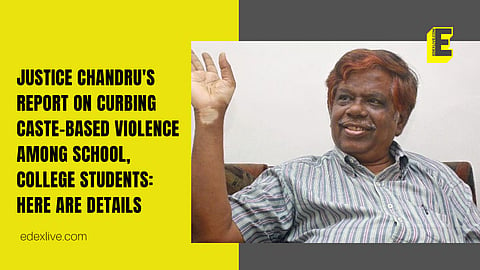

The report on how violence on the basis of caste and creed can be prevented among school and college students, submitted to the government by the one-man committee headed by Justice K Chandru, retired Judge of Madras High Court, contains many long-term recommendations to address systemic issues in blunt caste identities and tackle caste-based discriminations in educational institutions, especially schools.
Orientation programmes: He said an orientation programme should compulsorily be given at the beginning of every academic year for all students from Class VI to XII, facilitated by trained professionals and educators.
Student associations: The state government and school education department should permit all schools and colleges in Tamil Nadu to have student associations, with leadership elected annually by allowing students to vote.
Caste status of students to be kept confidential: The committee recommended that while maintaining the caste status of a student as a record file in the school, access to such a record should be confined only to the headmaster and other inspecting authorities visiting the school, ensuring that confidentiality is always maintained.
Ban mobile phones in schools: Stating that the government should strictly enforce banning the use of mobile phones by students on school campuses, the committee said this order should be applied not only to students of schools under the state board but also to those in schools affiliated with other boards.
Moral classes: The committee said moral classes must be made compulsory for students from Class VI to XII in all types of schools.
Every week, one period should be allocated for imparting Ara Neri (morals). The government should appoint a trained counsellor for each block, who will be required to attend all the secondary schools in that block.
"In case any student is addicted to drugs, the counsellor will recommend the admission of that student to a de-addiction centre at the expense of the state and will monitor the student's progress," he added.
School Welfare Officer: The state government must create a post of School Welfare Officer (SWO) for each secondary school with more than 500 students. In cases of co-education, there must be two SWOs, one of each gender.
The SWOs must monitor the functioning of the school regarding issues of ragging, drug menace, sexual assault and offences related to caste discrimination and should address these issues per the law.
Assessment of areas: The report further said the government should assess whether an area should be declared as caste atrocity-prone and take precautionary measures there.
The state government can also constitute a special intelligence unit to gather information on caste violence and identify persons or organisations involved in fomenting caste discrimination, the report added.
Posting and transfers: It recommended periodic transfer of high school and higher secondary school teachers.
On the posting of chief educational officers, district educational officers, block educational officers, and headmasters of high and higher secondary schools, the report said government should formulate guidelines for not posting persons belonging to the dominant caste of that area.
Attitude towards marginalised caste: The Annual Confidential Reports (ACR) for such officers should record their attitudes towards Scheduled Castes (SCs) and Scheduled Tribes (STs).
A code of conduct for teachers and staff of all types of schools, colleges, and universities run by the state must be prescribed statutorily.
He also recommended ascertaining the attitude of aspirants towards social justice issues while interviewing them for recruitment of teachers by the Teachers Recruitment Board.
Inclusivity component in BEd course: He urged the need for the syllabus for the BEd degree and for the Diploma in Elementary Education to undergo a thorough revision to ensure orientation towards inclusivity.
Merger of schools: While the committee recommended merger of various types of government-run schools like those run by the Adi Dravidar and Tribal Welfare and Backward Classes Welfare departments, it can be recalled that recent efforts by the state government has faced hurdles, especially from the staff associations in the schools who felt that their interests will not be protected.
